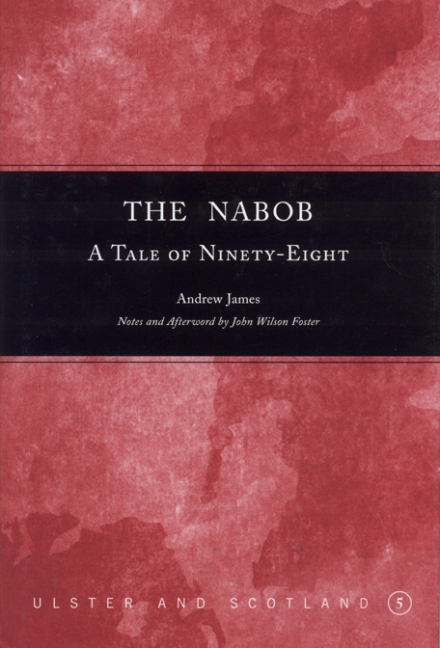The Nabob
A tale of ninety-eight
Andrew James. Notes and afterword by John Wilson Foster
‘James is a compelling writer in a style that might not unfairly be described as superior Boy’s Own … The tales here reflect much in the ghost story and ripping yarn tradition with underground passages, moaning ghosts, savage floggings, paintings that come to life, visitors in the dead of night, old retainers with long memories, riders on cliff-tops and so on', Rory Brennan, Books Ireland.
'The re-publication of The Nabob is a welcome development … With this publication Andrew James can take his rightful place amongst those Ulster writers who dared to write of ninety-eight', Stephen Dornan, JISS Book Reviews.
'The republication of this novel by Andrew James [James Strahan] is an important addition to the Ulster and Scotland Series produced by Four Courts Press and the Institute of Ulster Scots Studies at Magee. This is a valuable exercise for a number of reasons. The exploration of the interplay and cross fertilisation between Scottish and Irish writing has attracted much interest in recent decades, much of which has focused on the influence of Robert Burns on the ‘weaver’ poets of Antrim and Down. One area that has suffered from relative neglect has been the medium of prose fiction. There exists a major archive of novels, short-stories and newspaper articles that feature Lowland Scots as a major component of the speech of its characters and one that in its day enjoyed a popular, and international audience. The Nabob exemplifies this overlooked Irish sub-genre and it is gratifying to see its reclamation and diligent annotation and exposition. The novel should appeal to those interested in the folklore associated with the United Irish Rebellion in County Antrim, with its accounts of pitch-cappings, atrocities, the seeking of revenge and the actions of local combatants. It should also interest those curious about the Scots language of the country ... a rattling good read ... its reproduction provides the opportunity for much literary and linguistic discussion over the nature and extent of Ulster-Scots writing in previous generations', Frank Ferguson, Irish Economic and Social History (2007).
